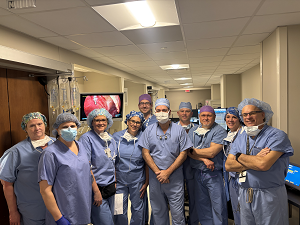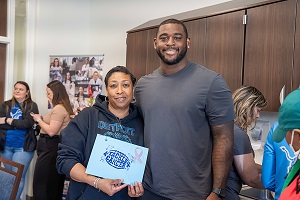Colon Cancer Prevention & Screening
March is Colon Cancer Awareness Month, and Henry Ford Health is inviting the community to step inside a larger‑than‑life, unforgettable learning...
When you have von Hippel-Lindau (VHL) syndrome, you and your family need highly specialized experts by your side. We have been recognized as a VHL Clinical Care Center by the VHL Alliance.
Our multidisciplinary VHL clinic brings together leading experts from more than a dozen specialties to help our patients navigate this complex, inherited hereditary cancer syndrome. We offer genetic testing, screening and minimally invasive and advanced treatment options for VHL patients.
This coordinated care approach ensures a treatment plan that includes regular screenings and appropriately timed therapies for our VHL patients and their families.
Von Hippel-Lindau Syndrome affects about one in 36,000 people worldwide. Patients with VHL syndrome commonly develop cysts in the kidneys, pancreas, and genital tract. Tumors may be either benign or cancerous, and most frequently appear in young adults, but symptoms can occur at any time.
Patients who have a parent with VHL have a 50 percent chance of inheriting the disease. VHL is not curable. It is the most common among genetic kidney cancer syndromes, making close monitoring and regular screening an important part of your overall care.
VHL syndrome requires a lifetime of care, including regular screenings for new tumor growth so treatment – most often surgery – can be provided as early as possible.
Our VHL team, led by Dr. Craig Rogers, the top kidney cancer surgeon in the Midwest, includes experts from genetics, urology, nephrology, cancer surgery, radiology, ophthalmology, neurology and audiology, all working together to manage your care.
Dr. Rogers completed his fellowship training at the National Cancer Institute, which helped discover the VHL gene and pathways, and was a national referral center for VHL patients.
At Henry Ford, our VHL patients and their families have access to the most advanced science-based treatments. We are a national leader in minimally invasive robotic surgery techniques and have one of the largest and most experienced cancer surgery teams in the country.
Your diagnosis, treatment plan and medical team is uniquely yours. With your multidisciplinary team, you will receive the answers to all your questions and access the support you need.
Sometimes you need more than medicine. We also offer compassionate support services to help you overcome your diagnosis and we work closely with the VHL Alliance to provide additional resources so you lead a healthy, full life..
March is Colon Cancer Awareness Month, and Henry Ford Health is inviting the community to step inside a larger‑than‑life, unforgettable learning...
This twice monthly group, facilitated by a professional counselor/social worker, offers patients an opportunity to express their feelings and...
Henry Ford Cancer is excited to partner with Detroit health organization The Village Personal Training and Wellness to bring you Sound Bath and...
The arts have powerful healing properties because art connects your mind and your body. Henry Ford Cancer has teamed up with Detroit's College for...

DETROIT — Newly published research conducted in Wayne County, Mich. found that non-smokers, particularly women, who lived near textile and...




Advances in medicine would not be possible if people didn't enroll in clinical trials. Here's how they work and how to get matched with one.

Learn how to detect pancreatic cancer, who is at risk and what treatment advances have been made in recent years.

Millennials are now at a higher risk for developing colorectal cancer than baby boomers. Here are some potential reasons why - and what you can do to lower your risk.

For women undergoing breast cancer treatment, yoga and other low-impact exercises have proven benefits for reducing stress and aiding recovery.
We use cookies to improve your website experience. By using this site, you agree to our Terms of Use. Read our Internet Privacy Statement to learn what information we collect and how we use it.